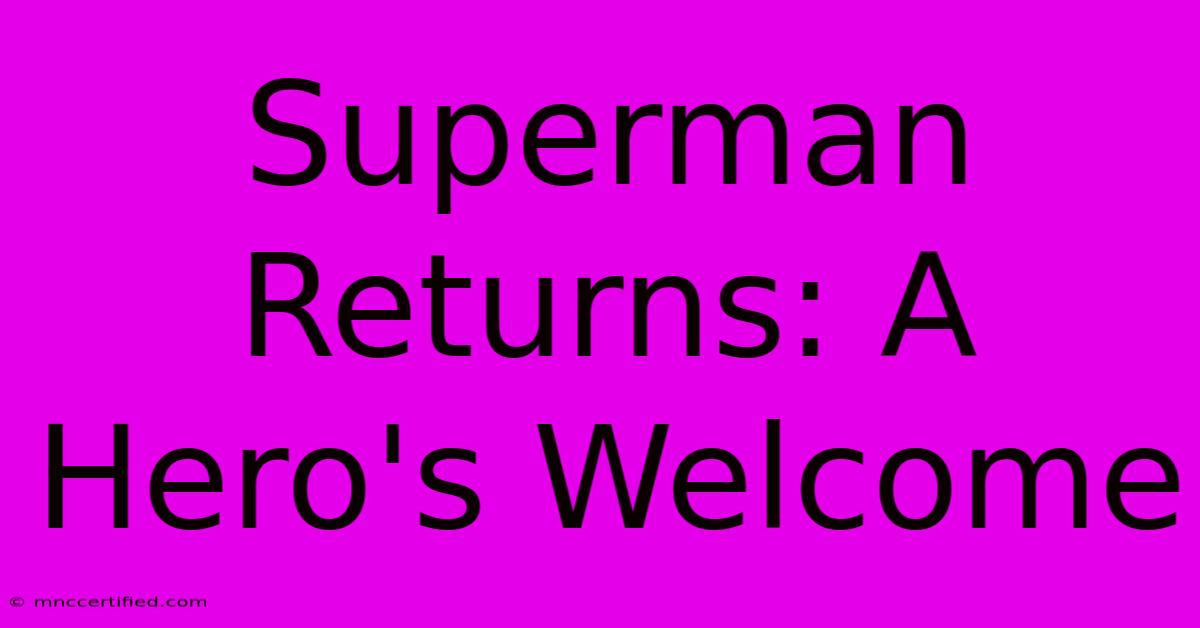Superman Returns: A Hero's Welcome

Table of Contents
Superman Returns: A Hero's Welcome – A Critical Look Back
Superman Returns (2006), a film often met with mixed reactions upon release, deserves a reassessment. While commercially successful, its critical reception was less enthusiastic, leading to a prolonged period of cinematic absence for the Man of Steel. However, looking back, Superman Returns offers a unique and compelling take on the iconic superhero, focusing on themes of identity, loss, and the enduring power of hope. This article delves into the film's strengths and weaknesses, exploring why it continues to resonate with audiences and deserves a place in the Superman canon.
A Different Kind of Superhero Story
Unlike its predecessors, Superman Returns doesn't focus on a grand, world-threatening villain. Instead, it delves into the personal struggles of Superman, specifically his emotional return to a world that has moved on without him. This intimate approach, while divisive for some, allows the film to explore the psychological toll of heroism and the complexities of Clark Kent's dual identity. The film's pacing, often criticized as slow, reflects this introspective nature, allowing the emotional weight of Superman's journey to sink in.
Exploring the Themes of Loss and Identity
The film masterfully explores the theme of loss. Superman's five-year absence has left a void in Lois Lane's life, leading to a new relationship and a different perspective on heroism. This forces Superman to confront the emotional consequences of his actions and the challenges of reintegrating into a life he's missed. This aspect is beautifully portrayed by Brandon Routh's nuanced performance as Superman and Kate Bosworth's compelling portrayal of Lois Lane. The film also subtly examines the identity crisis inherent in Clark Kent's dual life. He grapples with the weight of expectation and the constant struggle to balance his public persona with his private desires.
Lex Luthor: A Mastermind of Manipulation
While the central conflict may not be a massive planetary threat, Lex Luthor's (Kevin Spacey) presence provides a compelling antagonist. This isn't the bombastic Luthor of previous films. Instead, Superman Returns offers a more subtle, manipulative Lex, focusing on financial schemes and exploiting societal vulnerabilities. His plan, albeit seemingly less dramatic on the surface, represents a calculated threat to the fundamental fabric of society, mirroring real-world anxieties about power and corruption. His plan to flood the world with Kryptonite demonstrates a slow-burning evil that is all the more insidious for its subtlety.
The Visuals and Legacy of Donner
Bryan Singer's direction pays homage to Richard Donner's original Superman films, retaining the classic feel while modernizing the visuals. The cinematography, filled with stunning aerial shots and evocative imagery, captures the majestic scale of Superman's world. The film's commitment to a specific visual style, harking back to the Donner era, solidified its place within the broader Superman cinematic universe, albeit a different continuity. This stylistic choice, while possibly alienating some viewers looking for a more contemporary aesthetic, adds to the film’s overall nostalgic charm.
Criticisms and Lasting Impact
Despite its strengths, Superman Returns faced criticism for its pacing, its comparatively less action-packed nature, and the perceived lack of a truly iconic villain. However, its exploration of complex emotional themes and its visual homage to the original films have earned it a cult following over the years. The film’s impact on the subsequent Superman movies is undeniable, even if directly influencing them less than other iterations.
Conclusion: A Worthy Addition to the Canon
Superman Returns, despite its initial mixed reception, stands as a unique and thought-provoking entry in the Superman cinematic universe. Its focus on internal struggles and complex emotional themes offers a refreshing perspective on the iconic hero, proving that even without a massive scale battle, Superman's story can still be powerful and meaningful. Its lasting impact on the visual style and thematic explorations of subsequent films solidify its importance in the broader Superman canon. It's a film that deserves a second (or third) viewing, offering rewards for those willing to appreciate its slower pace and more introspective nature.

Thank you for visiting our website wich cover about Superman Returns: A Hero's Welcome. We hope the information provided has been useful to you. Feel free to contact us if you have any questions or need further assistance. See you next time and dont miss to bookmark.
Featured Posts
-
Donnarummas Face Psgs Monaco Win
Dec 20, 2024
-
Could Manilow Buy Copacabana In 2024
Dec 20, 2024
-
70mph Gusts Bristol Gale Warning
Dec 20, 2024
-
Beast Games Release Date Time Episode Guide
Dec 20, 2024
-
Dow Jones Today Mixed Stock Close
Dec 20, 2024